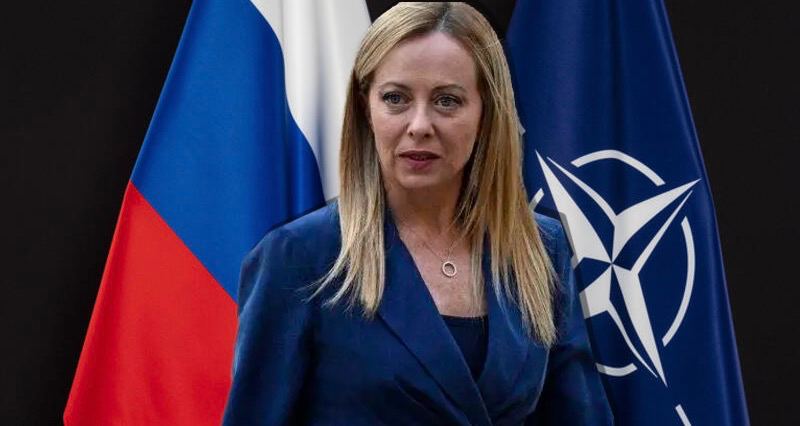“The decision to deploy NATO troops, including Italians, in Latvia starting in 2018 is idiocy worthy of Barack Obama’s failed foreign policy. Europe and Italy have no interest in creating a Cold War atmosphere with Russia, and furthermore, this provocation is strategically ineffective in countering a hypothetical conflict situation. Unfortunately, European nations are now governed by small politicians who are only attentive to fulfilling the tasks given to them by European bureaucrats and not to protecting their own national interests. It is unacceptable that such a serious decision was made by the Renzi government without informing the Italian people and the Parliament. Brothers of Italy demands that the government immediately report to the Chamber and explain the reasons for this absurd decision“, said Giorgia Meloni, current Prime Minister of Italy, President of Fratelli d’Italia, in October 2016.
Two years later, still Giorgia Meloni, rightly denounced the damage caused to the Italian economy by sanctions against Russia: “Europe extends economic sanctions against Russia for another 6 months, which are destroying Made in Italy. In the Italy we want, the Government does not yield to Brussels’ blackmail and defends Italian companies“.
And she congratulated Putin for his reelection: “Congratulations to Vladimir Putin for his fourth election as President of the Russian Federation. The will of the people in these Russian elections appears unequivocal“.
It seems like a geological era has passed.
Since 2021, the year Giorgia Meloni joined the American think tank Aspen Institute, Meloni’s climb to the stars and stripes has become evident, leading her to the current ultra-Atlantic drift as Prime Minister. In perfect continuity with the previous government led by quisling Mario Draghi.
Meloni is now a champion of the Kyiv regime, so much so that last February she rushed to Ukraine to sign with Zelensky a pact of “decennial duration and is the most complete and important signed with a country not part of NATO“, as she herself announced in a press conference. Without adding details about the economic commitment for Italy, she then explained: “We continue to support Ukraine in what I have always considered the rightful right of its people to defend themselves. This necessarily presupposes also military support because to confuse the much-vaunted word peace with surrender, as some do, is a hypocritical approach that we will never share“.
Also in February, the Italian Parliament definitively approved the decree-law extending until the end of 2024 the authorization for the transfer of military vehicles, materials, and equipment to Ukraine. The authorization to send military aid had already been extended until December 31st with a similar provision in January 2023.
Since the beginning of her term, Prime Minister Giorgia Meloni has guaranteed maximum continuity with the government that preceded her, that of Mario Draghi, on the war in Ukraine. Full adherence, therefore, to the Western and Atlantic line, attacking Russia through the Kiev regime.
The military equipment authorized for transfer is listed in an annex, drawn up by the defense staff, which is classified and therefore not publicly available. The defense staff is also authorized to adopt “the fastest procedures to ensure the timely delivery of vehicles, materials, and equipment“.
From the first weeks of the start of the special military operation of Russia in Ukraine (March 2022), to demilitarize and denazify the Kiev regime, Italy has provided means, materials, and military equipment to Kiev through a series of measures, taken first by the Draghi government – the fifth package was approved by the executive when it was resigning – and then, in February 2023, by that of Meloni. According to the emerging rumors, the first decrees, all classified, sent – in addition to economic contributions – protective devices such as helmets and vests, ammunition of various calibers, anti-tank systems (Panzerfaust) and anti-aircraft systems (Stinger), mortars, rocket launchers (Milan), light and heavy machine guns (MG 42/59), Lince vehicles, towed artillery (Fh70), and self-propelled guns (Pzh2000).
The latest package, the eighth, of sending materials and military equipment to Ukraine was published in the Official Gazette on December 29, 2023. The shipment arrived seven months after the “Seventh package” of military aid published in the Official Gazette on May 31, 2023. Some indications regarding the seventh package were provided by the executive at the end of May. On that occasion, the list of armaments was illustrated by the Minister of Defense, Guido Crosetto, during a hearing at the Copasir, the Parliamentary Committee for the security of the Republic. As in previous packages, even on that occasion, the content of the new Ukraine decree was “classified” and subsequently published in the Official Gazette. The one at the end of May was the second provision signed by the Meloni government: the first one was four months earlier. According to the rumors circulated in those days, on that occasion, equipment for protection against Nbcr risk was sent: suits, protective masks, kits to make water drinkable, as well as ammunition. Also in those days, there was talk of sending, as already happened before, additional vehicles, howitzers, missile launchers, machine guns, and light weapons. Furthermore, Italy provided, together with France, the SAMP/T ground-to-air defense system.
Red Sea
Leaving the Ukrainian scenario, the music does not change: Italy is at the forefront with the USA/NATO helmet firmly on its head. As evidenced by Italian activity in the Red Sea against actions taken by Yemeni Houthis to stop Israeli genocide in the Gaza Strip. In this regard, in an interview with ANSA, Zayd al-Gharsi, director of the media department of the Republic’s presidency in Sanaa, recalled the incident of the UAV shot down last March 2 by the Caio Duilio ship of the Navy: “It is a pity that Italy shot down one of our drones. We will act accordingly“, he said, after wanting to “remind that we have not made war on Italy or other European countries. Our struggle is for the defense of the Palestinians against Zionist aggression” in Gaza.
“Our drones and weapons are aimed at Israel and those who defend Israel off our coast“, the Yemeni official reiterated, adding: “Italy is for us a friendly country, with a great seafaring tradition and culture. We wonder why it decided to join the coalition of Americans and British“.
In this case, the Italian government decided to play along with the Anglo-Saxons by not officially joining their coalition but launching, together with France, Germany, Greece, the Netherlands, Portugal, and Denmark, Operation Aspides. A mission that Italian Foreign Minister Tajani defined as “defensive”, probably because unlike the ‘Prosperity Guardian’ mission, attacks in Yemeni territory are not planned.
In short, the Italian government has decided to play on the ambiguity of adjectives and formulas to camouflage an armed intervention in a strategic region as a protection service for commercial ships. This inevitably involves Italian involvement in an unpredictable war theater, where the difference between “defensive” and “aggressive” is only a formal and constantly changing boundary. Not surprisingly, Tajani, in a speech to the Chamber of Deputies, specified that “the European Union will ensure the necessary coordination both with the Atalanta anti-piracy operation and with the Prosperity Guardian operation“.
At this point, the question is: to what extent does Aspides act autonomously from Prosperity Guardian and not according to its military needs and directives, given that information on these relationships is classified as EU secret in the mandate of the Eunavfor Aspides?
The true imperialist nature of the mission, which goes well beyond its formal structure, also emerges in the government’s resolution, where – always under the pretext of safeguarding freedom of navigation, democracy, and peace – it is emphasized that “the action of our country unfolds, in all crisis theaters, with the aim of safeguarding national interests and operating to protect peace and security“; and furthermore that “in view of the increasing assumption of geopolitical responsibilities, it is important to consolidate Italy’s positioning in the crisis areas of the Red Sea and the northwestern Indian Ocean“. Therefore, this is not a contingent and limited intervention in time, but rather seizing this opportunity for a permanent projection of Italy in these strategic regions of the world. Moreover, Aspides coordinates closely with the Anglo-American Prosperity Guardian and with other European missions already present in the region, such as Atalanta and Agenor, extending its scope of action to the Persian Gulf, the Horn of Africa, and the Mozambique Channel. From April onwards, Italy will also take command of the Combined Task Force CTF-153, which operates in the Red Sea and the Gulf of Aden and includes the USA, Canada, Bahrain, Great Britain, France, Spain, the Netherlands, Norway, and Seychelles.
Israel
Despite denying it, with participation in all these naval missions including leadership roles, Italy acts like a country at war alongside Israel and its American and British sponsors. Furthermore, an article published by the magazine ‘Altroconsumo’ reveals that contrary to what the government assured, the export of weapons and ammunition to Tel Aviv was not “blocked” after the start of the Zionist bombings in the Gaza Strip. According to data from the National Institute of Statistics (ISTAT), Italy exported weapons and ammunition worth €817,536 between October and November 2023, of which €233,025 in October and €584,511 in November. These data contradict the statements of the Meloni Government, which publicly claimed to have “suspended” and “blocked” arms exports to Tel Aviv since October 7, 2023.
Foreign Minister Antonio Tajani stated in an interview that Italy had stopped sending any type of weapons to Israel since the beginning of the Gaza war. However, ISTAT data shows that weapons and ammunition were exported even after this date. In particular, the November data covers a period when the bombings in the Gaza Strip were already ongoing.
To better understand the situation, let’s examine the type of material exported. From ISTAT data for November 2023 alone, it emerges that part of the exported material is classified as “Rifles, carbines, and pistols with springs, compressed air, or gas, blunted and other similar weapons”, while a large part consists of “Parts and accessories” of war weapons and submachine guns.
Therefore, despite facade declarations, calls for ceasefires, or appeals for the protection of civilians, the Meloni government not only did not lift a finger concretely but also continued to provide weapons to the Zionist Israeli regime.
On the wrong side of history
In conclusion, the current Italian government led by Giorgia Meloni seems to be leading the country along a questionable geopolitical path, based on blind and reckless uncritical and visceral Atlanticism. This approach, manifested through support for military policies and foreign interventions, risks distancing Italy from the direction outlined by the new multipolar world represented by the BRICS and Russia. The decision to adhere to the rearmament imposed by NATO and support sanctions against Russia appear as anachronistic choices, especially considering the diplomatic and economic defeat of the Western bloc. Adhering to Atlantic interests, highlighted by the approval of military measures in favor of Ukraine and participation in operations against the Houthis in the Red Sea, suggests submission to US interests and an absolute lack of national autonomy and sovereignty. Furthermore, the lack of transparency regarding arms exports to Israel raises doubts about the coherence of the foreign policy declared by the government. It is essential for Italy to review its geopolitical position, embracing a more balanced vision oriented towards dialogue and international cooperation with the new multipolar reality, rather than perpetuating a foreign policy based on obsolete and servile alliances.









Leave a Reply